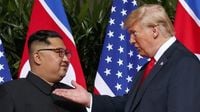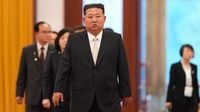North Korean leader Kim Jong Un has once again thrust his country and its nuclear ambitions into the international spotlight, recalling his "fond memories" of former U.S. President Donald Trump and signaling a conditional openness to renewed talks with the United States. Speaking before Pyongyang’s Supreme People’s Assembly on September 21, 2025, Kim made it clear that the door to diplomacy remains ajar—but only if Washington abandons what he called its "delusional obsession with denuclearization."
The remarks, reported by the official Korean Central News Agency the following day, come at a time of heightened tension and shifting alliances on the Korean Peninsula. Kim’s speech, delivered with his trademark mix of bravado and defiance, underscored North Korea’s unwavering stance: its nuclear arsenal is not up for negotiation. "We will never lay down our nuclear weapons … There will be no negotiations, now or ever, about trading anything with hostile countries in exchange for lifting sanctions," Kim declared, according to the Associated Press. He added pointedly, "The world already knows well what the United States does after forcing other countries to give up their nuclear weapons and disarm."
Kim’s message was unmistakable: North Korea sees its atomic weapons as the ultimate guarantor of regime survival and the Kim family’s dynastic rule. The North Korean leader has repeatedly said that denuclearization is not an option, a position that has only hardened since the collapse of his second summit with Trump in Hanoi in 2019. That meeting, the third between the two leaders, ended in stalemate over what concessions Pyongyang was willing to make in exchange for relief from U.S.-led sanctions.
Despite the breakdown in talks, Kim was surprisingly warm in his assessment of his former negotiating partner. "I still personally hold fond memories of the current U.S. president, Trump," Kim said, as quoted by state media and international news outlets. He went on to suggest that talks could resume if the U.S. were to "discard its delusional obsession with denuclearization and, based on recognizing reality, truly wishes for peaceful coexistence with us." In Kim’s view, recognition of North Korea as a nuclear-armed state is a prerequisite for any future dialogue.
Kim’s remarks come as former President Trump is expected to visit South Korea in October for the Asia-Pacific Economic Cooperation (APEC) summit, to be held in Gyeongju. The timing has fueled speculation in the media that the two leaders might attempt a surprise meeting at the inter-Korean border, reminiscent of their impromptu encounter in 2019. While nothing is confirmed, analysts like Lim Eul-chul of Kyungnam University told Agence France-Presse that Kim’s comments "hinted at the possibility of a surprise summit, while also playing to Trump's well-known yearning for a Nobel Prize."
Meanwhile, South Korean President Lee Jae Myung has departed for New York to attend the United Nations General Assembly, where he is expected to address the ongoing nuclear tensions on the peninsula and urge North Korea to return to talks. Yet Kim’s speech left little doubt about his view of Seoul. "We make it clear that we will not deal with them in any form," Kim stated bluntly. He has suspended virtually all cooperation with South Korea since the failed Hanoi summit, and last year he ordered North Korea’s constitution to be rewritten, cementing the South as a permanent enemy. North Korea has even gone so far as to blow up rail links and roads connecting the two countries, further demonstrating its hardline stance.
Experts see Kim’s latest statements as a calculated attempt to set the terms for any future engagement. Hong Min, a senior analyst at the Korea Institute for National Unification, explained to AFP, "It reaffirms the North's stance that recognition as a nuclear-armed state, along with a willingness to improve relations with it, are the prerequisites for dialogue." The speech, according to Yang Moo-jin, former president of the University of North Korean Studies in Seoul, reflects "equal parts confidence and desperation"—aimed as much at foreign powers as at shoring up domestic support.
Underlying Kim’s confidence is a shifting regional landscape. In recent years, North Korea has dramatically increased its weapons testing, showcasing missiles capable of striking U.S. allies in Asia and even the U.S. mainland. These provocations, analysts say, are designed to pressure Washington into accepting North Korea as a de facto nuclear power and to negotiate economic and security concessions from a position of strength.
At the same time, Pyongyang has strengthened its ties with Russia and China, seeking to counterbalance U.S. influence. Kim’s visit to Beijing earlier this month, where he appeared alongside Chinese President Xi Jinping and Russian President Vladimir Putin at a military parade, was widely seen as an effort to boost his diplomatic leverage. North Korea has openly supported Russia’s war in Ukraine, sending thousands of troops and large quantities of military equipment to assist Moscow. The two countries even signed a mutual defense pact last year during Putin’s visit to Pyongyang, cementing an alliance that has raised alarms in Seoul and Washington.
For its part, the U.S. remains steadfast in its insistence that North Korea must give up its nuclear weapons before sanctions can be lifted or meaningful engagement can resume. Successive rounds of U.N. sanctions have failed to deter Pyongyang’s nuclear ambitions, and Kim was quick to claim that these measures have only "helped the North in growing stronger, building endurance and resistance that cannot be crushed by any pressure."
As the world watches for signs of a diplomatic breakthrough—or a further escalation of tensions—the stakes could hardly be higher. South Korea, in particular, is growing increasingly concerned that it may lose its voice in future negotiations, as Kim seeks to bypass Seoul and deal directly with Washington. With Trump’s visit on the horizon and the region’s security environment in flux, the coming weeks could prove pivotal.
Kim Jong Un’s latest speech may have been aimed at multiple audiences—foreign adversaries, potential negotiating partners, and his own people. But the message was clear: North Korea will not be cowed, and any path to peace or dialogue must begin with recognition of its nuclear status. Whether Washington, Seoul, or the international community are willing to accept those terms remains to be seen. For now, the world waits, wary and watchful, as old rivalries and new alliances reshape the future of the Korean Peninsula.


